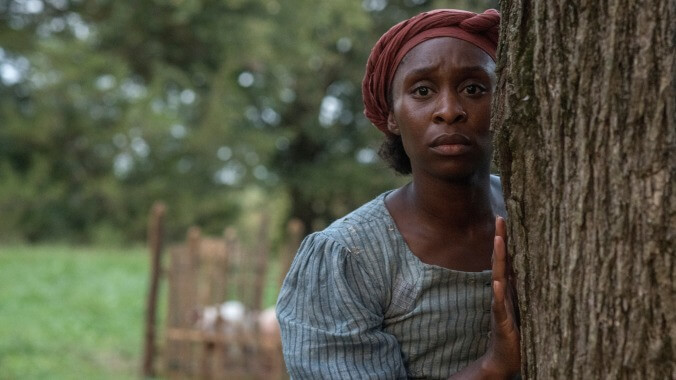Cynthia Erivo makes a compelling Harriet Tubman in a slightly shallow biopic of the American hero


Biopics about Black women are rare, and Harriet doesn’t waste an opportunity to make a statement, positioning its titular subject as an intelligent, crafty, and vengeful superhero. There is no second-guessing or doubt in the version of Harriet Tubman presented by director Kasi Lemmons (Eve’s Bayou) and her cowriter, Gregory Allen Howard (Ali), and actress Cynthia Erivo spins that unwavering audacity into some riotously crowd-pleasing moments. But Harriet isn’t the deepest portrait of the real-life abolitionist and the daring rescue operations she launched through the Underground Railroad.
The film begins in Maryland in 1849, when twentysomething Tubman, then still a slave and going by her birth name, Minty Ross, is experiencing one of her “spells”—a sort of trance during which she sees memories of the past and glimpses of the future. A deeply religious woman, Minty is convinced that these visions are messages from God, preparing her for upcoming hardships. And that sense of certainty is applicable to all aspects of Minty’s life: She’s deeply sure of her love for her husband, John (Zackary Momoh); she’s consumed by hatred for her master’s son, Gideon Brodess (Joe Alwyn), who has a specific fascination with her; and she knows that she can no longer live in bondage. “I’m gonna be free or die,” Minty says, and when she learns that Gideon plans to sell her, she runs on her own, leaving her husband, siblings, and parents behind.
One hundred miles later, after a tense chase involving white men with guns and dogs, Minty jumps over the Maryland border, the sun illuminating her body as she steps forward into a new life. Once in Philadelphia, Minty reinvents herself, choosing the new name Harriet Tubman (for her mother and husband, respectively) and throwing herself into work with the abolitionist movement led by William Still (Leslie Odom Jr.). Still thinks Harriet’s conversations with God could be brain damage and doubts whether she can recreate her journey from Maryland with other escaped slaves, but Harriet refuses to allow any man to control her. “Don’t you tell me what I can’t do,” she fires back, and the film shifts fully into presenting her as Harriet Tubman, Avenger.
Erivo, who made strong impressions in last year’s Widows and Bad Times At The El Royale, was a controversial choice for the role, as she’s British and not African American, but also because of some previous remarks about Black Americans. But the actor builds a convincingly resourceful Harriet. Her Tony-winning voice radiates grief as she sings the spiritual “Farewell Oh Farewell” to her family before her escape; after Minty has transformed into Harriet, Erivo exudes swagger and confidence as a conductor on the Underground Railroad. Erivo isn’t provided many opportunities for reflection—the film leans heavily on desaturated flashbacks to convey the character’s regret, rather than providing those notes for her to play. But she effectively conveys a woman in constant forward motion.
Nina Simone’s “Sinnerman” accompanies a montage of Harriet-led escapes, and Lemmons builds strong tension as Harriet’s work becomes more high-profile and she attracts more adversaries. Her relationship with Odom’s Still becomes repetitively contentious—the script underserves Still in particular, who more than once warns Harriet that they live in “dangerous times”—but Erivo has excellent chemistry with Janelle Monáe, who plays a free Black woman who becomes Harriet’s closest friend. And as Harriet’s father, Ben, Clarke Peters adds welcome humor, with a running gag about him tying on a blindfold before Harriet escapes so he can honestly say he didn’t see her leaving.
Only barely does Harriet incorporate other notable abolitionists, showing but never quite identifying Frederick Douglass (Tory Kittles) and John Brown (Nigel Reed). Maybe that makes sense: This is Tubman’s story, not a comprehensive overview of the movement. But the film expresses implicit doubt that said story can stand on its own, overrelying on Terence Blanchard’s score to dictate emotional cues and cutting away to a parallel storyline involving Gideon, who the movie uses as an all-purpose representation of slavery’s evils and a sounding board at which Harriet can direct her declarations about the importance of freedom. Her conflict with the slaver provides Harriet with its most easily, righteously badass moments; it’s certainly satisfying to see her turn Gideon’s gun back on him. But it’s a problem that the film only really shows us who she is—her strength and resilience—when she’s facing off against him. A better version of Harriet might have kept the focus squarely locked on the real-life hero at its center, instead of defining her through the relationship with the man who once owned her.